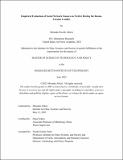Empirical Evaluation of Social Network Sensors on Twitter During the Russia-Ukraine Conflict
Author(s)
Ahlers, Miranda Nicolle
DownloadThesis PDF (3.098Mb)
Advisor
Eckles, Dean
Terms of use
Metadata
Show full item recordAbstract
The immense magnitude of information sharing, paired with increased privacy considerations, has rendered global monitoring of social media platforms virtually infeasible. Heuristic algorithms grounded in the friendship paradox have provided simple, accessible methods for strategic sampling of information from platforms while only requiring knowledge of the local network structure. However, it still remains unclear how well such algorithms perform in contexts where the spread of information consists of exogenous and endogenous modes of propagation.
Herein, I evaluate the ability of randomly selected friends of random users to provide early awareness of discussions related to the Russia-Ukraine conflict on Twitter. I find that while selected sensors are more centrally located within the Twitter network, they fail to reliably provide early awareness of conflict-related hashtags. Lack of performance is exacerbated when only early adopters from each group are included in evaluations. Additionally, I find that the difference in time of adoption between control and sensor groups provides limited information about how popular a hashtag will become. Further, I propose a framework for using early participation in conflict discourse to condition the selection of sensors for future war-related trends – exploring both friendship and prior retweet connections as potential sensors. I then outline two systematic approaches for objectively quantifying the value of information acquired from selected sensor groups – a count-based approach and a predictive modeling framework. Ultimately, I find that both local and retweet sensors significantly reduce the noise of information produced by a random control group while effectively capturing over 80% of hashtags that become widely shared.
Date issued
2023-06Department
Massachusetts Institute of Technology. Institute for Data, Systems, and SocietyPublisher
Massachusetts Institute of Technology